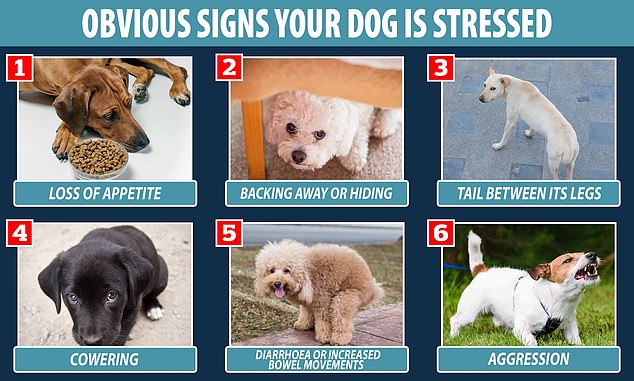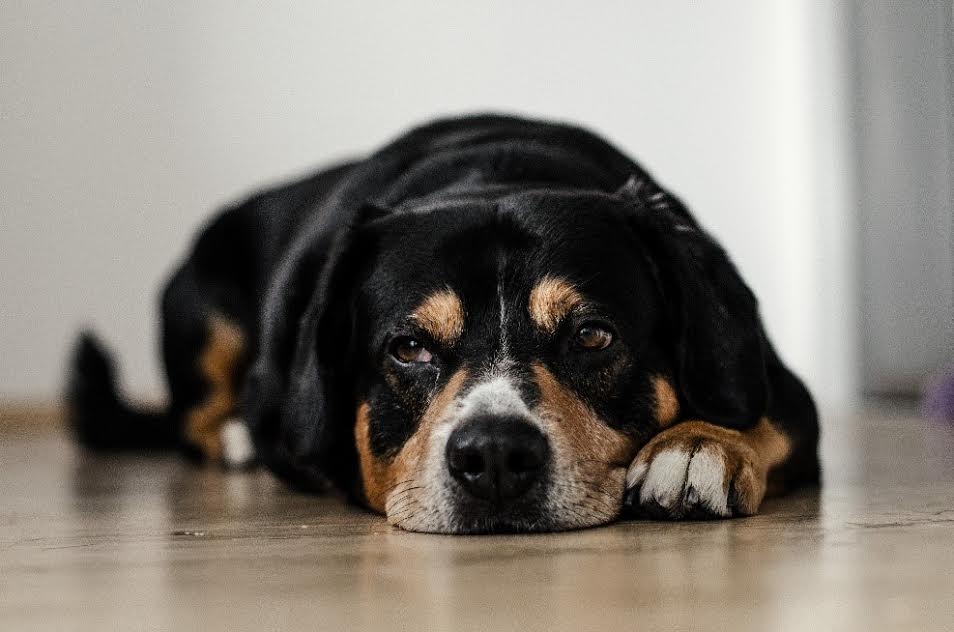Animal charity Blue Cross is warning dog owners to be on the lookout for signs that their pup is stressed, which it says can lead to behavioural issues.
Obvious signs a dog is stressed include a loss of appetite, aggression, having its tail between its legs or backing away from someone or something, Blue Cross says.
Subtle signs of stress that are more easily missed include excessive panting, pacing back and forth, a dog licking its lips when not eating or drinking, and pinning its ears back.
The UK charity is concerned that thousands of dogs could be sold or abandoned if the signs of stress are misinterpreted as a personality defect.

'Signs of stress can be easily missed or misunderstood,' Karly Smith, animal behaviourist at Blue Cross, told MailOnline.
'For example we might think a dog who yawns is just tired, or if they’re not eating that they’re just not hungry.
'In fact both of these can be signs that your dog is anxious about something.'
Blue Cross also fears some dogs may be stressed and develop behavioural issues as routines start to change at home when the Covid 19 lockdown ends.
Dogs purchased as puppies in the last year have only ever known what it's like to have their family around them at all times.
The sudden change when owners start to commute to the office again could trigger separation anxiety in dogs.
Owners should therefore get their dogs used to short half-hours periods of being alone now, to get them used to potentially being alone for much longer periods of time.

Over the last year, Blue Cross has received more than 500 calls to its behaviour line from concerned owners needing advice.
'Many of the calls last year were due to pets struggling with changes to their routine, with people and families being at home more,' said Claire Haynes, also an animal behaviourist at Blue Cross.
'Dogs like routine and the new normal may be confusing and stressful for them.
'With routines set to change again, this could come as a shock and lead to more stressed out pets and behaviour issues if the signs aren't spotted early and handled correctly.
'In the most serious cases, stress could lead to unwanted behaviours, such as aggression and health problems.'
In the UK, hundreds of dogs bought as puppies during lockdown last year are being abandoned by owners who claim to not have the time or resources to look after them, it was recently revealed.
With some people having paid out large sums for new dogs and puppies during lockdown, and prices continuing to surge due to demand, some owners may look to sell their dog online to recoup some of their financial investment they made.
Sellers have flooded pet websites with adverts for dogs aged between six and 12 months and many young pups are turning up at rescue centres.
Puppies, in particular, have missed out on normal life during in the last year – unable to attend training classes due to lockdown measures.
This lack of training and socialisation just increases the risk of behavioural issues.
Blue Cross is therefore urging people who may be struggling with a pet's behaviour to seek support and advice from a charity or registered trainer, rather than giving up and selling the animal on to a new owner.
Dr Roger Mugford, an animal psychologist used by the royal family, has advised dog owners to have 30-minute breaks from their pets several times a day in order to ease them into being alone when the lockdown ends.
Blue Cross also believes owners should be planning ahead and making gradual changes to their routines now to ensure their pets are ready for 'the new normal'.
In some cases, dog owners might be taking their pets on public transport to keep them company throughout the day.
'If you’re going to be travelling into work with your dog, do practice runs of the route with them so that by the time you’re going back to the office your dog feels confident travelling in with you on the train or tube,' said Smith.
'If you’re planning to leave you dog at home while you go to the office, make sure again you build up the time you spend away from them so that they can get used to you not always being there.
'We’d never advise leaving a dog at home alone for long periods of time, so if needed make sure to arrange a dog sitter or someone your pet trusts or can build up that trust with so that you can be confident of leaving them together.
'Start making any changes to your daily routine slowly.'






-20260108103159.webp)






-20260217073221.webp)




-20260216115008.webp)



















